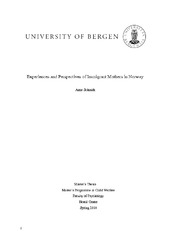Experiences and Perspectives of Immigrant Mothers in Norway
Master thesis
Permanent lenke
https://hdl.handle.net/1956/18638Utgivelsesdato
2018-06-22Metadata
Vis full innførselSamlinger
Sammendrag
In just one generation, Norway has witnessed a five-fold increase in its immigrant population. Along with the increase in the immigrant population, the number of immigrant children who receive child welfare measures has increased disproportionately. Social work in a multicultural society demands different skills from practitioners than work within a more homogeneous society. In order to understand their ethnic minority clients, workers must be aware of the difficulties these clients face on a daily basis. This research aims to hear and represent the experiences and perspectives of immigrant mothers from a strengths-based perspective, and thereby provide a stronger evidence base for social work practice. A qualitative phenomenological design was chosen for the study. Data from two focus group interviews and two in-depth individual interviews has been used. Theoretically, the research was framed by concepts of parenting, acculturation, cultural translation and resilience. Findings revealed that informants faced challenges related to them both as individuals as well as in their role as mothers during their integration process. They dealt with these challenges by using both their individual resources and resources in their environment. The differences between the collectivistic oriented home society and the individual oriented Norwegian society, the loss of their social network, the authoritarian ways of child raising versus a democratic family structure, and children acculturating faster than parents were all salient themes next to language barriers and challenges related to the bureaucratic system. At times, the differences between cultures led to the emergence of new traditions or ways of raising children, which demonstrates that neither culture nor child raising is static, but is instead influenced by the social environment.
